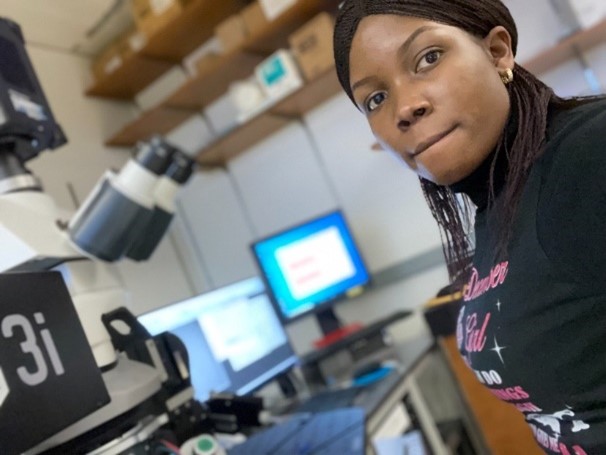GET TO KNOW VICTORIA...
My name is Victoria Nwachukwu. I am a graduate student in the Department of Physiology, University of Manitoba. I graduated as a medical doctor from the College of Medicine, University of Nigeria; and prior to starting my program at the U of M, I taught medical physiology in the University of Nigeria.
My current research is directed towards understanding why and how electrical stimulation of the spinal cord in people with spinal cord injury brings improvement in locomotion as well as functioning of organs that support movement like the heart. I am particularly excited about my project because it will be a first step in bridging the gap in knowing how electrical stimulation used to improve walking after injury also has benefits of improving organ function. It will also give insights into improving this technology in the care of people with spinal cord injury to better their quality of life.

Q & A
QUESTION 1)
Q: What is it like to be a woman in bioscience?
A: I would say challenging, but at the same time exciting because I understand the relevance of the work I am doing, and the potential it holds to better the lives of millions of people.
QUESTION 2)
Q: Who or what inspired you to become a medical doctor and graduate student?
A: I always knew that I would end up doing science one way or another. It is a dream that I had nurtured from childhood. Our family doctor might have played a role in my decision to go into medicine. He was very kind and I loved the way he took care of us whenever we fell sick. As a child, I thought it was "magical" to suddenly feel well a few days after visiting the hospital. I also remember always choosing to role-play the doctor during kids' activities. Then, in high school, I loved biology as a subject and was never bored studying how the human body works in health and disease. Many years down the line and the feeling remains the same.
QUESTION 3)
Q: Who are your women role models and not necessarily in science?
A: My biggest role model is my mom. She is a Professor of Education. In terms of building a career, she taught me how to be determined, resilient, focused and hard working. I want to believe I am everything she trained me to be. I admire that she was able to get to the peak of her career in record time and also raise a beautiful family with my dad.
I also admire Dr. Kristine Cowley. She is the present Director of the Spinal Cord Research Center at the University of Manitoba and she is my supervisor. She is one of the most resilient persons I have ever met. Kris is a great scientist, a leader; very knowledgeable and of course, witty. I am feel privileged to be her student and I really look up to her.
QUESTION 4)
Q: Do you think there are particular structural roadblocks that impede the progress of women in science?
A: I am not sure how to answer this question. I feel that women can be whatever they want to be; and can attain whatever height they wish to attain in science. However, it is worth mentioning that women still face some level of gender discrimination in certain workplaces in many countries, and that might impede the rate of progress in their career paths.
QUESTION 5)
Q: Would you say that through your career, things have become better for women working in the bioscience industry?
A: I think it would be safer for me to say that things will become better for women working in the industry through my career. My personal experiences and my determination to make a difference stimulated me to venture into academics and biomedical research. I may be relatively young in field of biomedical research, but I am confident that I will make a positive impact through my career in the future.
QUESTION 6)
Q: How did you reach your level of success, given the sector’s gender gap, especially among leadership?
A: Well, I am still work-in-progress; I am not yet where I want to be but I am not quitting. I have some mind-blowing success stories too. In terms of leadership, the times I was chosen to lead a group or serve people, I believe I was selected because I was found a great fit for the position. There is no doubt that there is gender gap especially in leadership. However, personally, I channel my energy towards building myself, gaining experience and developing skills that will make me stand out among the crowd when the need arises.
QUESTION 7)
Q: What are the biggest obstacles you had to overcome?
A: I experienced a setback one time in my clinical career, but that did not stop me from setting new goals and moving on to achieve them.
QUESTION 8)
Q: If you had the option to give advice to a younger version of yourself, what would that be?
A: Never doubt yourself even when it feels like all the odds are stacked against you.
FAVOURITE QUOTE
“Nothing in life is to be feared, it is only to be understood. Now is the time to understand more, so that we may fear less.”
-Marie Curie
CONTACT INFORMATION
LinkedIn: @Victoria Nwachukwu
Instagram: @iam_drvictoria
